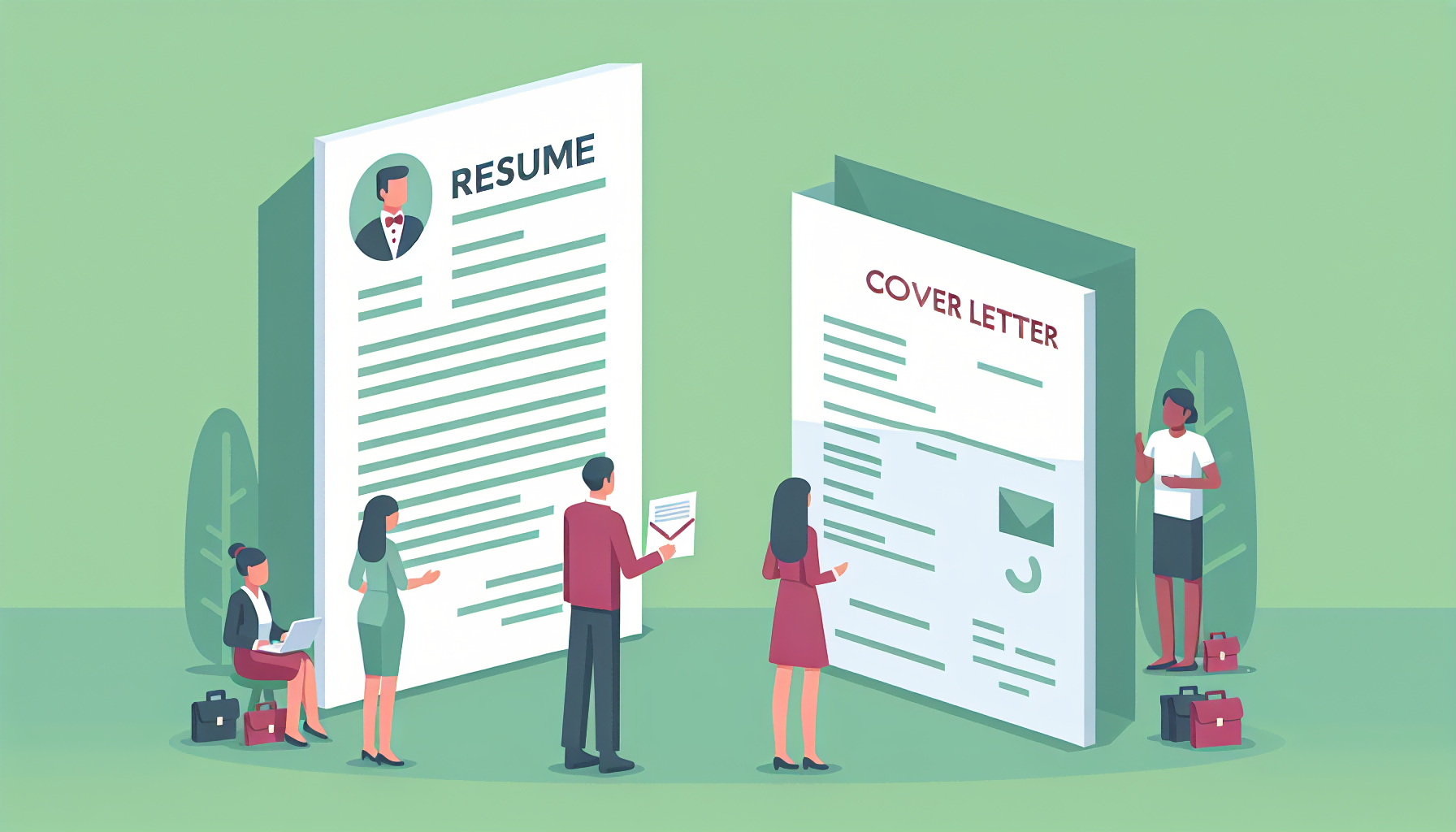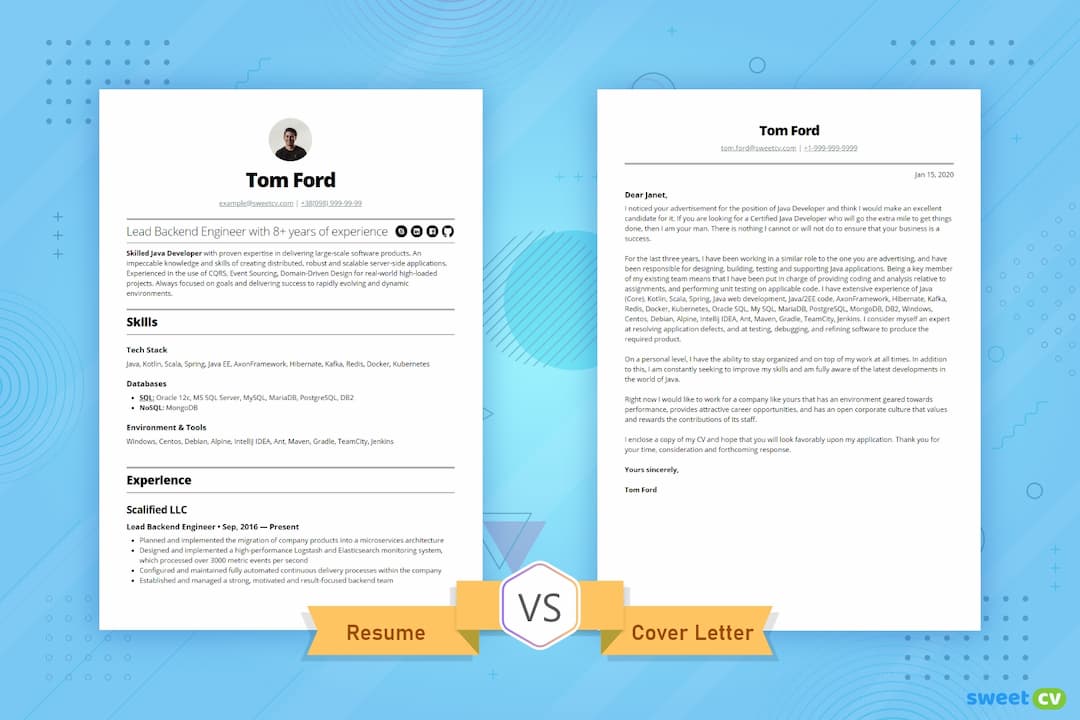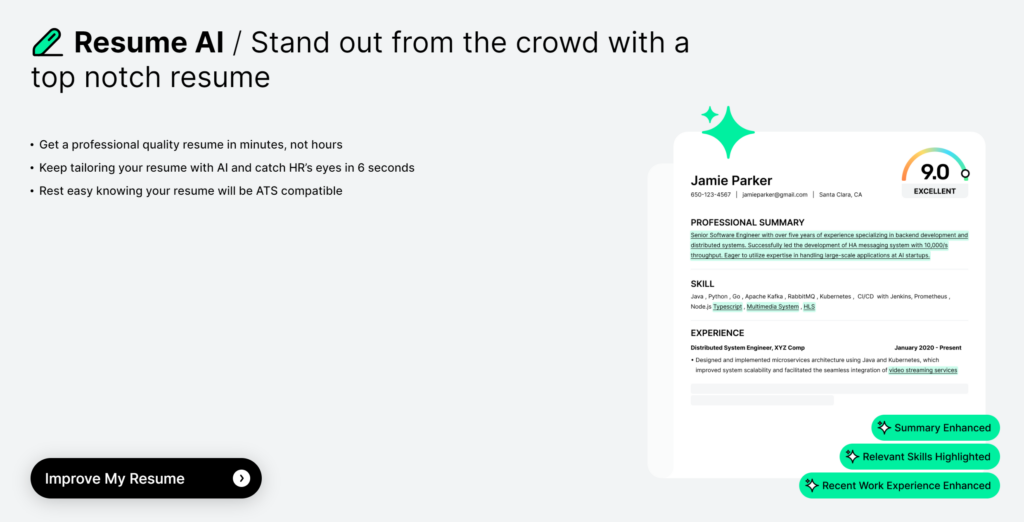A Resume vs a Cover Letter–How to Use Them?

Table of Contents
You have numerous opportunities during the hiring process to showcase your personality, credentials, and experience to a possible employer. Among them, a hiring manager will frequently form an opinion of you based on your cover letter and CV. But a cover letter and resume serve different functions.
This article will go through the distinctions between a resume and a cover letter, as well as what should be on each and examples of both.
Understanding the Basics: What Are They? 📚

Resume:
A resume is a strategic, concise document, usually not more than one or two pages long. It presents a snapshot of your professional life and is often formatted in bullet points for easy reading.
The resume starts with vital contact information, followed by a powerful objective or summary statement to grab the reader’s attention. It then documents your work history, focusing on responsibilities and achievements in each role, starting with the most recent position.
Directly following work experience generally sits the education section, highlighting academic credentials. Also, a comprehensive resume encapsulates vital sections like core competencies or skills, where you enlist technical and soft skills relevant to the job role you’re applying for. Plus, other bespoke sections like additional certifications, courses, languages known or even volunteering experiences.
In a nutshell, a resume should be seen as a marketing tool that exhibits your skills, experience, and accomplishments most relevant to the job you seek.
Cover Letter:
A cover letter is your professional introduction. More like a pitch, it’s an opportunity to explain why you’re interested in the role, why you’re the best fit and how you could contribute to the potential employer’s team.
Unlike the list-like structure of a resume, the cover letter is paragraphed and narrative. It typically starts with a polite greeting, followed by an introduction where you mention the job you’re applying for. The body of the letter follows, where you highlight unique achievements and experiences from your career, relevant to the desired role, and tying these examples back to the position’s requirements.
The conclusion reiterates your interest in the role, thanks the reader for their time, and indicates your desire for the next step, like an interview or follow-up call.
A well-articulated cover letter is your conversation starter. While it profile your unique selling points, it should also convey how your goals align with the company’s mission.
Dissecting the Structure 🔎

A resume is typically divided into sections: contact information, objective or summary, work experience, education, skills, and, if applicable, additional sections such as publications, certificates, or volunteer experiences. The flow is generally chronological, although functional or combined resumes may significantly focus on skills, particularly when there are gaps in employment history. If you want more tips on resumes, check out our previous article: Resume
Cover letters, however, follow the standard business letter format. It begins with a greeting, an introduction, a body (usually one or two paragraphs), and a closing section. Unlike a resume that shines a spotlight on your history and qualifications, a cover letter focuses more on your ambition, its alignment with the job role, and how your unique skills and experiences can contribute to the company.
CV vs Cover Letter – What Are the Differences? 🖊️
A resume principally lists down the facts and accomplishments verbatim. It encompasses job titles, responsibilities, and achievements within each position, educational degrees, and skills.
Conversely, a cover letter goes beyond the bare minimum to tell a story. It connects the dots for the recruiter by taking bits and pieces from your resume applicable to the role and paints a more comprehensive picture.
- A CV is a lengthy document that describes the applicant’s career, including their experience, qualifications, skills, competencies, and accomplishments. Meanwhile, a cover letter includes simply a brief description of the applicant and complements all of the significant aspects of the CV, providing examples.
- The CV is a thorough document that contains a lot of information, however the cover letter is brief and to the point.
- A CV normally includes sections and bullet lists for all of its information, whereas a cover letter is usually classified into sentences and paragraphs.
- CV can frequently not be adapted for the job post you are applying for, however your cover letter should always be modified, since it is a far more personal document that describes your interest in a certain job offer and firm.
When to Use Which? ⚖️

As a standard procedure, most job applications ask for both a cover letter and a resume, each serving a unique purpose.
A resume serves as a factual and concise document that neatly lays out your qualifications and job history. It allows the recruiter or hiring manager to quickly assess your candidacy based on your skills, job history, qualifications, and achievements. Its objective, data-focused nature makes it an ideal tool for communicating hard facts about your professional journey.
On the other hand, a cover letter is your platform to demonstrate your passion, personal drive, and the unique value you would add to the company. It offers a glimpse into your personality and provides context to the information laid out in your resume. By connecting your skills and experiences directly to the job description, this document tells your story and aims to convince the employer that you are a great fit for the role.
While it’s important to note that all job applications are different, a general rule of thumb to follow is:
- Use only a cover letter if the job advertisement specifically states so. Clearly articulate your qualifications and how your accomplishments align with the goals of the position.
- Use a resume when a succinct, objective overview of your skills and experiences is asked for. This is often the case for job fairs or when uploading your job history to an online job portal.
- Use both documents when the job advertisement requests them. This is the most common scenario. In this case, it’s essential to ensure your resume and cover letter work in harmony – complementing, not duplicating each other.
Revolutionizing Job Search with Jobright.ai 🚀
In today’s fast-paced world, a tool that simplifies the job application process can be a game-changer. Here, allow me to introduce Jobright.ai, an integrated platform designed to streamline your job search and application processes, radically enhancing your chances of landing the right job.
🌐All Jobs, One Platform: Say goodbye to endless browsing on multiple job portals or company websites. Jobright.ai offers job sourcing from various networks, aggregating all available opportunities onto a single platform. It navigates the vast digital job market efficiently, saving your invaluable time and energy.
📝Resume Building/Tailoring: With recruiters spending an average of 7 seconds skimming a resume, standing out is vital. Jobright.ai’s features encompass not only pre-designed professional resume templates but also guidance on tailoring your resume per the selected job application. It ensures that your application aligns closely with the job description, enhancing its visibility and making a lasting impression.
🤝Insider Connection: One of the invaluable features of Jobright.ai is its ability to provide insider connections. It helps potential job seekers skip the queue with referrals, maximizing their chances of landing a job interview. Networking and referrals significantly escalate your visibility in the recruiter’s eye.
The job searching process is a journey, and Jobright.ai serves as a reliable companion, simplifying the process and opening the gateway to numerous opportunities. Whether you’re crafting your first job application with a resume and a cover letter, or you’re a seasoned professional looking for a career pivot, Jobright.ai is the tool to help you shine in the competitive job market.

